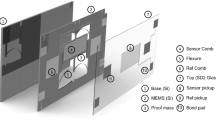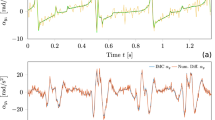Abstract
IN our pilot studies concerning the effect of space environments on the circadian leaf movements, we have devised a small lightweight leaf movement recording system using a strain gauge coupled to an amplifier and a recorder. The need for such a system was dictated by the physical limitations of an orbiting capsule. We have also found that such a system is useful for earthbound experiments. The small size of the sensing unit makes it possible to place several units on a single plant. The monitored plant can easily be placed in a small control chamber and continuous records of several weeks' duration can be obtained when the movements are recorded on a strip chart recorder.
This is a preview of subscription content, access via your institution
Access options
Subscribe to this journal
Receive 51 print issues and online access
$199.00 per year
only $3.90 per issue
Buy this article
- Purchase on Springer Link
- Instant access to full article PDF
Prices may be subject to local taxes which are calculated during checkout
Similar content being viewed by others
Author information
Authors and Affiliations
Rights and permissions
About this article
Cite this article
HOSHIZAKI, T., YOKAYAMA, K. Recording Leaf Movements with a Strain Gauge. Nature 207, 880–881 (1965). https://doi.org/10.1038/207880a0
Issue Date:
DOI: https://doi.org/10.1038/207880a0
Comments
By submitting a comment you agree to abide by our Terms and Community Guidelines. If you find something abusive or that does not comply with our terms or guidelines please flag it as inappropriate.



